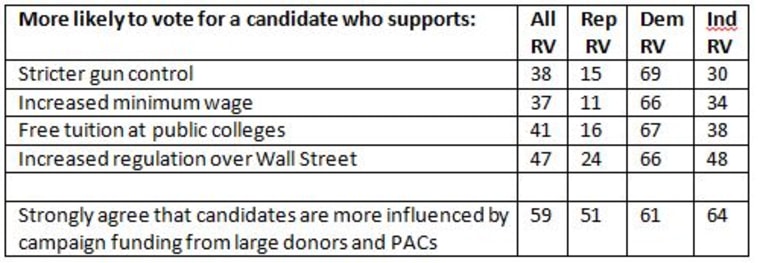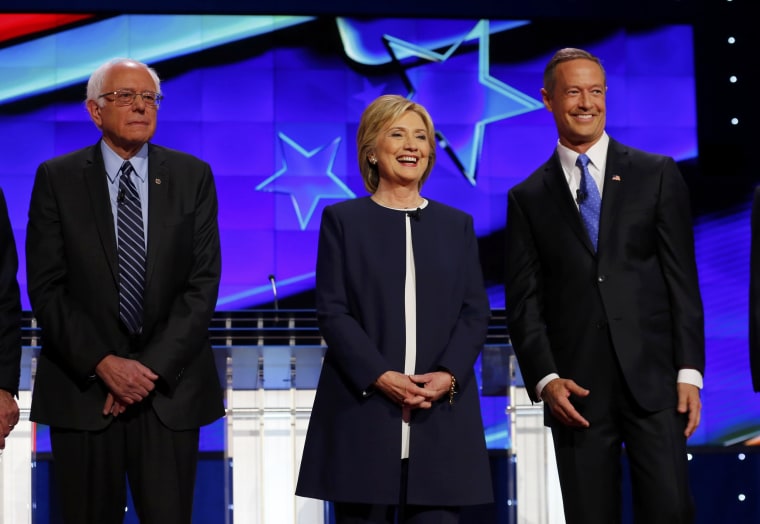Tuesday’s Democratic debate showed that Hillary Clinton and Bernie Sanders have some stark policy differences that separate them, including different approaches to gun control, college tuition, foreign policy, and regulating Wall Street. The latest NBC News online poll conducted by SurveyMonkey found that Democratic voters are vastly unified on most of these issues – but the general electorate is split.
While both Clinton and Sanders must battle for the heart of the Democratic base in order to be the eventual nominee, going too far to the left on any of these issues could lose centrist voters in a general election, as the poll’s results show.
- On gun control, Clinton’s call for more stringent laws is in sync with her party. More than two-thirds of Democratic voters say they are more likely to vote for a candidate who supports stricter gun control laws, but just 30% of independent and 15% of Republican voters would.
- Sanders’ plan to boost the minimum wage to $15.00 from $7.25 appeals to two-thirds of Democrats, but just a third of independents would favor a candidate who would raise it.
- Most Democrats are more likely to vote for a candidate who supports free tuition at public colleges, even if it raised government spending, an idea put forth by Bernie Sanders. This idea hugely resonates with voters across all parties under 30 (60% are more likely to support), compared to just 1 in 3 voters over 65.
- Increased regulation over big banks and Wall Street gets the broadest backing across voters of all parties. Two-thirds of Democrats, nearly half of independents, and even a quarter of Republicans are more likely to vote for a candidate willing to take on Wall Street. Before the debate, Clinton rolled out a plan to regulate the financial industry, although it stops short of Sanders’ proposal to break up the big banks.
- There’s a reason that Sanders has continually talked about his campaign being funded by small donors and that Donald Trump emphasizes that he’s using his own money to fund his campaign. Majorities across all parties strongly agree that candidates who receive most of their funding from large donors, corporations, and political action committees (PACs) are more influenced by special interest groups.

Issues Where the Candidates Collide
As a self-proclaimed “Democratic Socialist,” Bernie Sanders strikes a chord with a large segment of his party’s voters. Two thirds agree that the government must do more to reduce the gap between the rich and everyone else. But a full third of Democrats favor government policies that would ensure that everyone in America has the opportunity to reach the highest income class, even if not everyone makes it. Sanders’ socialist leanings may not help him in general election – independents are split, with slightly more favoring the American dream approach to making it big, compared to a more egalitarian strategy.

For Hillary Clinton, her reputation as a “hawk” on foreign policy is one that does not play very well with Democratic voters, even those supporting her. Eighty-three percent of Clinton supporters say the best way to ensure peace is through good diplomacy, as do 92% of Sanders supporters. Again, independents are divided, with slightly more favoring diplomacy as a path to peace. Nearly three-quarters of Republicans favor military strength.
Clinton, Sanders, and O’Malley all have faced criticism earlier in their campaigns for not being sensitive to the Black Lives Matter movement. During the debate, all three noted that more work is needed to reform the criminal justice system. The NBC News/SurveyMonkey poll found this sentiment echoed by 75% of Democratic voters, who say more changes are needed to give blacks equal rights with whites. But 81% of Republican and 61% of independent voters say that the country has made the changes needed.
Hannah Hartig, Stephanie Psyllos, and Josh Clinton contributed reporting.
The NBC News Online Poll was conducted online by SurveyMonkey from October 13-15, 2015 among a national sample of 4,898 adults aged 18 and over. Respondents for this non-probability survey were selected from the nearly three million people who take surveys on the SurveyMonkey platform each day. Results have an error estimate of plus or minus 2.0 percentage points. A full description of our methodology and the poll can be found here.
The poll was produced by the Data Analytics Lab of NBC News in conjunction with Penn’s Program on Opinion Research and Election Studies with data collection and tabulation conducted by SurveyMonkey.
